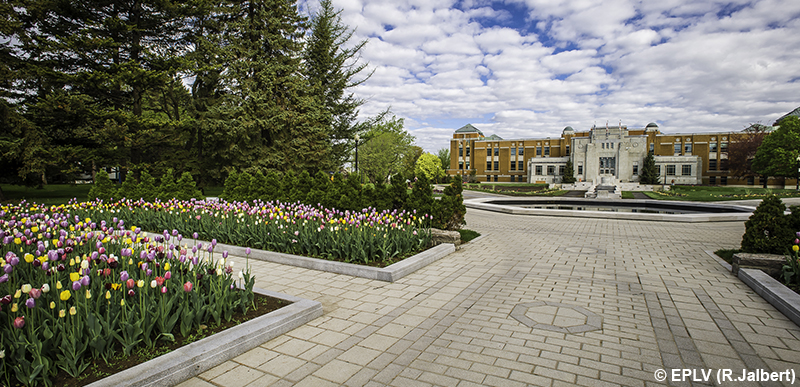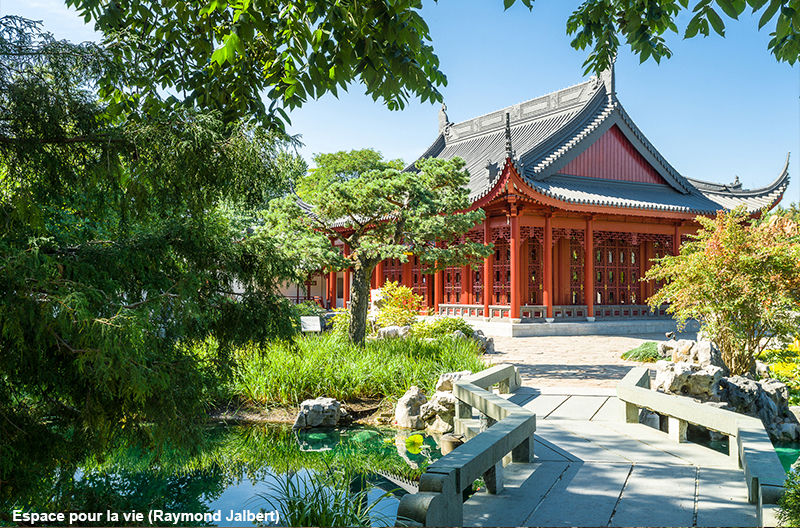11 January 2022

Exploring the Montréal Botanical Garden

The Botanical Garden, Montréal’s internationally acclaimed showpiece, has so much to offer. Give yourself over to the enchantment of the colours and the scents all along the pathways. Look up at the trees and admire their structure and their multifaceted foliage and the dozens of native bird species that enliven them. The greenhouses display an incredible variety of plants and flowers—all your senses will be awakened. Young and old alike will be captivated by the natural and architectural beauty of the Montréal Botanical Garden, which is part of the Space for Life museum complex.
Accessible pathway at the Botanical Garden
Discover the Kéroul pathway, a course made accessible for people with reduced mobility so that they can make the most of the Garden’s main attractions. The trail starts at the east end of the Garden, loops around, and comes back to the main entrance.
On the map showing the pathways and attractions, you’ll find an accessible path that follows the Botanical Garden’s main loop, although it does miss some of the attractions. You can easily get around between the ponds if you want to meander there. On the east side, the map shows a small additional loop for you to enjoy the rose garden in bloom during the summer.
The paths shown on the map as partially accessible are more uneven. There may be steep inclines or surfaces that are less suitable for people with mobility aids. We advise you to stay on the accessible paths or on the Kéroul accessible pathway.
Garden’s main entrance
To get on the accessible pathway, you must enter the Garden through the main entrance located at the intersection of Pie-IX Boulevard and Sherbrooke Street East. From there you can walk through the greenhouses first, before strolling along the accessible pathway described here.
The Greenhouses

The Greenhouses are accessible all year round to people with reduced mobility. They have permanent or themed exhibitions that showcase the Botanical Garden’s living collections. In summer we are guided through tropical vegetation, while in winter the Greenhouses offer us a haven of peace away from the cold. You will find 36,000 plants in completely different worlds. Pass from the arid region to the begonias before crossing the tropical forest; see the orchids and much more.
The accessible way around the Botanical Garden
This is the nicest route for people with reduced mobility. It starts at the east of the Garden, loops around, and returns to the main entrance.
The Rose Garden

Start your journey in the Rose Garden, where 10,000 rosebushes bloom in flowerbeds cover 2.5 hectares. Created for the 1976 Olympic Games, the Rose Garden is one of the largest in North America.
The Chinese Garden

The accessible pathway runs along this garden. The Friendship Hall Pavilion is partially accessible for people with mobility aids.
The spatial organization of these places reflects the principle of yin and yang. The Garden’s harmony is based on four main elements: plants, water, stones and architecture.
The Japanese Garden

Continue on to the Japanese Garden, a space dedicated to reflection and symbolism. Each element, plant, tree and stone has been carefully selected and arranged to make one harmonious whole. Watch the Koi fish in the pond and stroll along the paths.
In the cultural pavilion you will find photo exhibitions and a tea room. From this pavilion you can also access the bonsai courtyard.
Be careful though, some slopes are steep.
The Flowery Brook and the Lilacs
Go around the first pond, then cross between the ponds. Take the time to really look at the flora and fauna all around this beautiful place. The spring and summer blooms are the main attractions of the Flowery Brook. Let the subtle fragrances and the diversity of the iris, peony and daylily species engulf your senses.
The Garden of Innovations
This garden features new trends and cultivars of annuals, perennials, trees and ornamental shrubs. The decorations are renewed every year, featuring hybrid plants rigorously selected for their hardiness, beauty and resistance to disease.
The Alpine Garden

From the Rockies to the Himalayas, from the Alps to the Arctic tundra, the Alpine Garden takes you on a botanical world tour. Look up and see the all the floral diversity. Summer is the best time to go there.
Be careful though, some slopes are steep and rocky.
The Food garden
This garden presents an overview of the diversity of plants cultivated for their economic importance on local or international market. It offers a small tour of the world through the history of these plants essential to our survival.
The Perennials Garden
Perennials are plants that go dormant in the fall, use their subterranean organs to survive the winter and resume growth in the spring. The Perennials Garden offers a dazzling succession of blooms from spring to frost. When you leave this last garden, return to the main path and head to the restaurant for a gourmet stop, or the exit if you have had your fill!
The other sections of the Botanical Garden

The Aquatic Garden
Aquatic plants inhabit a series of pools and are perfectly at home in their element.
You can see this garden from the pathway, but it is not completely accessible for people with mobility aids.
The First Nations Garden
This garden showcases the botanical knowledge and activities of the first inhabitants of the Americas.
The terrain in this garden is more natural, similar to a wooded area, so it isn’t always easy to get around. You may need the help of a companion. Please note that the washrooms are not accessible and that the exhibition’s information panels are high up and on glass, so contrast may be missing.
The Arboretum
Partially accessible depending on which path you take, the Arboretum holds an impressive variety of trees and shrubs, both native and imported.
The information panels are close to the ground and some are far from the main pathway, which makes them hard to read without the help of a companion.

The Frédérick-Back Tree Pavilion
Located at the north end of the Botanical Garden, the Frédéric-Back Tree Pavilion is accessible. It is a bit of a trek to get to, but it is well worth the detour, as it makes people aware of the roles played by trees in different aspects of our lives, and in the ecological balance of many ecosystems.
The washrooms and the outside courtyard are partially accessible: the access ramp is steep and the door to the disabled access toilet is not all that wide.
The restaurant
There is a restaurant near the Reception Gardens where you can get something to eat.
The shop
Located inside the main building, near the greenhouses, this shop offers gardening‑related products, books, stuffed animals and souvenirs from Montréal, as well as a vast selection of environmentally -responsible products made by Québec artists and artisans.
Since space is tight, you may feel a little cramped in the shop.

Practical information
Admission
Different rates are available. All the fee details are on the website.
Where can I find accessible washrooms?
![]() Accessible washrooms:
Accessible washrooms:
- The Chinese Garden
- The Japanese Garden
- The main building (lunch counter)
![]() Partially accessible toilets:
Partially accessible toilets:
- The main building
- The restaurant
The secondary entrance is accessible, but on a steep slope.
How to get to the Botanical Garden
Adress
4101 Sherbrooke Street East
Montréal, QC H1X 2B2
By public transit
The Pie IX métro station does not have universal access at this time. The bus system should meet your needs, so please see the section on STM accessibility for more information.
By paratransit
The paratransit leaves passengers in the parking lot near the ticket office.
By car
The parking lot contains 6 spaces for people with disabilities. The cost is $12.50 per day. Please see the box office staff to purchase a monthly or annual Espace pour la vie sticker.
Discounts
The Accès Montréal Card gives you free access (for you and a companion if you have a disability) to the outdoor gardens during opening hours, except during the Gardens of Light event.
Enjoy your stroll through the Botanical Garden!


















